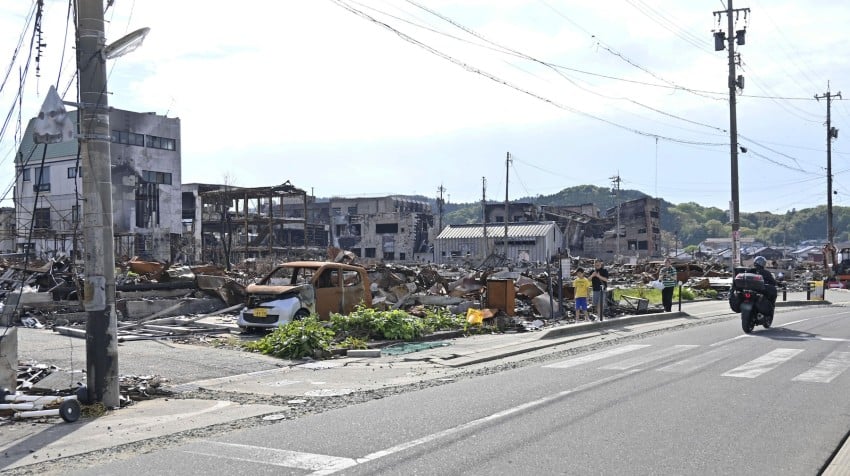Residents of the Noto Peninsula in central Japan have been witnessing a curious surge in tourists, a mere five months after the region was severely damaged by a major earthquake.
While some see the boost in tourism as a positive -- a way for people to grasp the reality of the situation in the region amid growing concerns of a drop in visitors following the New Year's Day temblor -- others argue the trend of people traveling to the remote peninsula in Ishikawa Prefecture is a form of "dark tourism."
Experts say there are benefits to people seeing the devastation first-hand, provided the focus is on its historical value rather than focusing on the death and tragedy that occurred, with tourists urged to continue supporting the peninsula, which extends into the Sea of Japan, once they return home.
Dark tourism is a term used to describe travel done for the fascination of seeing places historically associated with death and suffering.
At the Wajima Asaichi, a morning market that has operated for more than 1,000 years in the regional hub of Wajima, tourists took pictures of the destruction left at the site with their smartphones during the Golden Week holiday season.
One man stopped his motorbike to look at the devastation of the burned ruins, gazing with amazement at the transformed landscape.
"I know what happened because of news media reports, but I'm shocked to see the actual scene," said the man in his 50s from the city of Toyama, who visits Noto annually. He added that he had not come merely on a "pleasure jaunt" but brought medicine and other relief supplies to hand out to the disaster's victims.
A motorcyclist in his 40s visited the area from Kumagaya, Saitama Prefecture, near Tokyo, during a biking tour across Japan. "Time passes in the blink of an eye here," he said. He plans to write about his trip to Wajima and what he saw there in his travel blog.
Transportation networks severed in the quake-stricken areas have been gradually restored, making it easier for visitors to travel to the region, while some local restaurants have reopened.
Some local residents welcome tourists to Noto now that visitors to the peninsula have declined.
Noriko Takebayashi, 60, who operates a flower shop in Wajima, was recently surprised when she was asked for directions by a driver from Kagoshima Prefecture, the southernmost prefecture on the island of Kyushu. She obliged, but said she hoped the driver would let others know about the city's devastation.
The owner of a restaurant in a tourist facility in Wajima suggested that it is important to look forward instead of "always crying" about the disaster. "Tourism remains alive because people come to see the effects of the earthquake," she said.
But other locals are more resistant to having visitors, especially if they are only coming to witness the devastation. "Some come here just for fun," said a woman in her 50s.
Shocked by the devastated condition of Wajima Asaichi, a place so familiar to her, she is still reluctant to go there herself and has mixed feelings toward tourists walking around the area.
Akira Ide, professor of tourism studies at Kanazawa University, pointed out there is "a strong tendency in Japan to view dark tourism as inappropriate." Following the March 2011 earthquake and tsunami that hit the Tohoku northeastern region of Japan, people criticized the tourists who visited the devastated sites.
But Ide also said that dark tourism enables visitors to consider how reconstruction projects should be carried out, as they can discover facts not reported in the media and learn first-hand about disasters.
Stressing that visitors should pay due consideration to disaster victims, Ide said they "might as well travel to affected places if they can explain the reasons for their visits."
He said because of the prolonged reconstruction work underway and the continual support it needs, efforts to prevent a decline in visitors in the area are needed more than ever.
He called for continued financial support for the Noto region from tourists after they return home through donations and other measures, such as the "hometown tax" program, which lets people earmark part of their tax payments for specific municipalities.




















